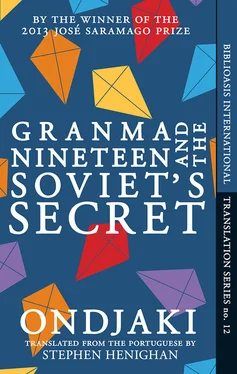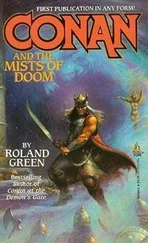We went outside again, which is what we should have done in the first place to follow Gudafterov to see where he was going.
“Do you figure it’s for those birds?”
“It must be.”
“And what are those birds for?”
“Could be that they eat birds. They say that the Chinese eat dogs, and in Cabinda Province they eat monkeys.”
“Is that so?”
“Yeah.”
Lots of trucks had started to roll off the construction site, full of garbage and sand that wasn’t going to be used. The late afternoon dust of Bishop’s Beach got stirred up again. Dona Libânia came to the window with the cloth handkerchief that she put over her nose. The Comrade Gas Jockey also covered his face and blinked his eyes, and if Granma Nhé had been there, with all those dust clouds, she would have ordered me back into the house because of my asthma attacks. And then I remembered her in the operating room.
“Do you think it sucks having a toe cut off?”
“To tell you the truth, if it’s done with an anaesthetic, I figure it shouldn’t be too much of a hassle. But if they don’t have any anaesthetics in the military hospital, it must hurt like anything.”
“I guess Comrade Rafael KnockKnock wouldn’t do that to her. And Aunty Tó wouldn’t let him.”
“You’re right. It’s not going to hurt at all. It’s just when she wakes up that she might feel some pain.”
The dust lifted in spirals like the smoke from mountains dynamited in cowboy movies. The trucks passed by, the drivers shouted words in Soviet, Sea Foam bounced around, running with his threads and his dreads dancing in the wind, and the drivers honked their horns to avoid running him over.
“Hey, listen.” 3.14 was also fanning his face to keep the dust away. “Is it really true that Rafael KnockKnock put on a tango so that your aunt would dance with him?”
“I swear it’s true. I was there and I saw it.”
“That guy must be a bit crazy, too. He doesn’t even know how to speak Angolan.”
“I think he did it so that she’d be happy before the operation. Maybe it helps. I dunno… I started wondering if she isn’t going to miss her toe. My granma’s very conceited.”
“I doubt it. That’s just the granmas gossiping. Also, she has so many other digits, how’s she going to miss one of them?”
“Yeah, you’re right.”
“But listen, that tango music, is it Cuban?”
“It must be.”
“And how come he couldn’t just put on a kizomba ?”
“I guess you can’t dance a kizomba with a crippled toe.”
Often, when I saw Sea Foam come running, I’d start laughing.
“You goin’ crazy, too?” 3.14 would ask me.
I laughed a little less hard. Sometimes I kept my feelings secret; other times I didn’t, I spoke the truth.
“Sea Foam looks like a bird that’s about to take off.”
And so he did. I dreamed about this once: his feet coming closer and closer to not touching the ground, his threads taking on the shape of a MiG’s wings, his dreads standing out straight to indicate the direction of his flight, his feet peddling in the air, and he himself laughing at me, uttering phrases in the crazed Cuban that he spoke.
I saw him come running from the bakery, down that alley we used to go to the Kinanga Cinema, and he accelerated fast. Maybe when he was studying in Cuba he was also one of those athletes: it seems like sports is a duty over there and they wake up early to go swimming or running. I don’t know; that’s what I’ve heard. Foam always wanted to run a race against João Serrador’s 1100 motorcycle, but he didn’t last, the bike went past him faster than a cannon ball. João Serrador only braked when he was already close to the curve, and if he pulled a wheelie — which he did a lot — the stop was even more abrupt and we applauded him, and right there Foam discarded everything he had in his hands to leap up and applaud João Serrador’s manoeuvres.
That morning I saw Foam running in a silence where the only noise was made by his feet hitting the ground. I remembered again the near take-off he failed to achieve because he was carrying an enormous sheaf of newspapers in his arms. The papers made you think of the Delta wings that used to appear during the breaks on television.
He was running very fast in our direction.
“Let’s just split,” 3.14 requested. “Don’t you see he’s coming this way?” He grabbed my hand to pull me.
“Why should we run? He never did a thing to you.”
“He’s got a screw loose. Some day he might think I am an American ship and want to bombard me. Didn’t you hear about that idea of his about finding clues to an American invasion and I don’t know what else?”
“Cool it. He knows you’re Pi, better known in Angola and the far-away Soviet Union as Comrade 3.14. Hahaha!”
“Are you making fun of me? If he attacks you, don’t wait for me to save you. I’ll even tell him to bombard you with napalm, like in the Vietnam movies.”
“Cool it, man. He’s not in that kind of mood.”
“How do you know?”
“Just look at his face. He wants to talk to somebody.”
Sea Foam looked just like João Serrador’s bike. He hit the brakes when he got close to us, and even kicked up dust.
“The plans, compañeros. El futuro is close, a de-fence against el pasado .”
“A fence?”
“Closer.” He lowered the newspaper, spreading it over the ground like a big map. “Not a single tiny house will remain!”
It was a huge page with a half-crumpled drawing of the government’s plan for the whole Mausoleum area, with tiny pictures that were dotted with symbols where they were going to put new parks, swing sets, a new waterfront drive close to the sea, lots of space with lawns where dogs could walk and poop all over, slides, water fountains, mature trees that I don’t know how they were going to grow so fast, and a ton of people lining up to enter the Mausoleum and see the body of the Comrade President, embalmed with Soviet techniques.
“Whoa. Wait a minute.” 3.14 looked really frightened. “I don’t see my house here — or even the gas station.”
“I don’t see the beach with the Old Fisherman’s boat, or my granma’s house, either.”
“And I don’t see the kennel I have in my yard to keep a certain animal… Hahaha.” Sea Foam said “animal” with a crazy voice and we took off running to get away from him.
“Didn’t I warn you?” As 3.14 ran, he looked as if he’d seen a soap opera wolfman.
“Just keep running and don’t look back.”
“Right now is when we’re gonna get bombarded.”
Foam loved to frighten children. He had never once touched anybody; maybe one time somebody had fallen over fleeing from him because a person who’s running can slip and hit a knee on a stone, blood can even flow, but it was never on purpose. Except once Senhor Tuarles grabbed Foam and, to be on the safe side, unloaded one hell of a thrashing on him just to calm him down for a while.
Foam grabbed the sheaf of newspapers again and almost took off flying. He ran without looking at the car that was about to pass, crossed the square, hit the edge of the beach running flat out and, wetting his feet and his clothes, only stopped to talk to the Old Fisherman, way off in the distance.
“We can stop. His missiles aren’t long-range.” 3.14 was sweating like anything.
“Could all that stuff be for real?”
“You think the Jornal de Angola is going to print lies? You retard — everything that comes out in the Jornal de Angola is the truth — the Comrade President authorized them to come out there.”
“So that’s the new Bishop’s Beach?”
Читать дальше












